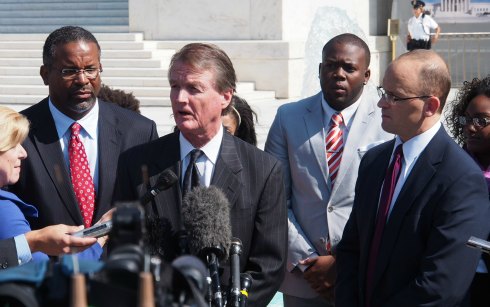
A decision Monday by the U.S. Supreme Court striking down the use of race as a determining factor in public college admissions is being cheered by legal experts of the Project 21 black leadership network, which had argued in a legal brief filed with the Court in the case that such preferences violate the Equal Protection Clause of the 14th Amendment.
“The days of institutionalized racism are long gone, so it should be an accepted fact that public colleges cannot play a racial game of Chutes and Ladders with their admissions policies,” said Project 21 Co-Chairman Cherylyn Harley LeBon, a former senior counsel for the U.S. Senate Judiciary Committee. “I applaud the justices for realizing that terms such as ‘diversity’ are merely code words for quotas and set-asides that neither foster racial harmony nor truly help those who are allowed to skip the line. We owe people the best education possible, and preferences betray that ideal.”
In Fisher v. University of Texas at Austin white plaintiff Abigail Fisher alleged racial preferences caused her 2008 admissions application to the University of Texas at Austin to be rejected in favor of what she said was a lesser-qualified minority candidate.
Race-based admissions were outlawed in Texas in 1996 by the 5th Circuit Court of Appeals Hopwood v. Texas decision, but were reinstated at UT-Austin after the U.S. Supreme Court cited a “compelling state interest” for classroom diversity in its ruling in the case of Grutter v. Bollinger in 2003.
The university’s admissions policy was previously upheld by a district court judge and a three-judge panel of 5th Circuit Court of Appeals.
Project 21 joined an amicus curiae (“friend of the court”) legal brief submitted to the U.S. Supreme Court on Fisher’s behalf that was written by the Pacific Legal Foundation. That brief was named by The Weekly Standard as “the most persuasive overall” of similar briefs in the case filed against race preferences.
The brief notes: “Diversity cannot be viewed in a vacuum as an abstract good; constitutional scrutiny arises because of the means — racial classifications — that are being used to achieve the end… Unlike remedying past intentional discrimination, which has its roots in the historical evils of the slave trade, slavery and Jim Crow, the benefits flowing from a diverse student body was an invention of politically interested social scientists.”
“The vision of the framers and Martin Luther King is validated. There simply is no need to continue academic or employment apartheid in American any longer,” said Project 21 Co-Chairman Horace Cooper, a former congressional leadership legal counsel and constitutional law professor.
Project 21 also was the only conservative organization to publicly appear on the Supreme Court plaza to challenge groups such as the NAACP and Al Sharpton’s National Action Network on the day of the Shelby County arguments.
The U.S. Supreme Court will hear another case concerning admissions preferences, Schuette v. Michigan Coalition to Defend Affirmative Action, in its 2013-14 term, which begins in October. That case involves the constitutionality of an amendment to the Michigan state constitution requiring colorblind admissions policies for public colleges and universities in that state.
Project 21 is sponsored by the National Center for Public Policy Research, a conservative, nonprofit think tank established in 1982.
(Photo: Bill Powers – President of the University of Texas at Austin, flanked by supporters. Courtesy of the SCOTUS blog)
